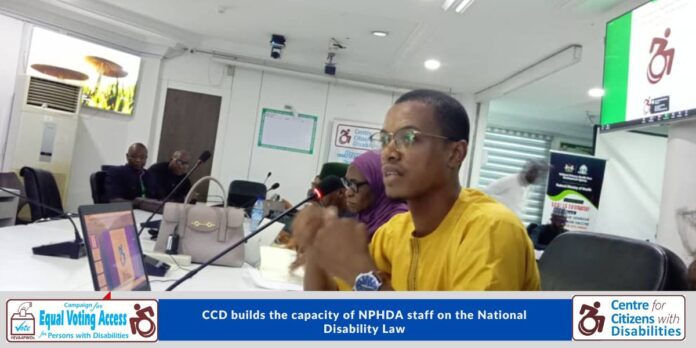By Abuja Reporter
Center for Citizens with Disabilities (CCD), has trained 182 staff of the National Primary Healthcare Development Agency (NPHCDA) on the sections, provisions and penalties of the Discrimination Against Persons with Disabilities Prohibition Act 2018.
The training held in Abuja, was themed: Creating awareness around the National Disability Act:Building the capacity of line Ministries, Department and Agencies (MDAs) staffers.
Mr David Anyaele, the Executive Director of CCD said that it had become pertinent to train and build the capacity of relevant health stakeholders on the contents of the law.
Anyaele, who was represented by Mr Humphrey Ukeaja, CCD Lead Researcher, said that the major challenge of health policy actors remained lack of awareness of the law and its provisions.
“Based on the findings from our 2021 assessment of access to COVID-19 vaccines for PWDs.
“We discovered the challenges faced by social and health policy makers includes but not limited to lack of sufficient knowledge and scanty data of Persons with Disabilities (PWDs).
“Also poor knowledge on the rights, needs and other issues of critical concerns to PWDs especially with regards to the national disability Act.
“We can attribute this to poor engagement by government Ministries, Departments and Agencies (MDAs) responsible for creating awareness and sensitising the public on the national disability law and its provisions.
“We believe this training and capacity building will help to support planning.
“It will also guide health service providers on their roles in providing and implementing proper health polices with reference to the law and for benefits of PWDs,” he said.
Mrs Peace Ezekiel, CCD program officer, said that the NPHCDA undeniable played a pivotal role in the health sector and its contributions to enhancing healthcare for PWDs could not be over-emphasised.
She recommended that the NPHCDA should collaborate with the National Commission for Persons with Disabilities (NCPWDs), to build the capacity of managers, administrators and field health workers on ways to enhance compliance to the disability Act.
She also appealed to the NPHCDA to set an example for other health agencies by providing PWDs friendly assistive devices to aid access to the NPHCDA head office.
The Executive Director of NPHCDA, Dr Faisal Shuaib, applauded the initiative of the group to train and build capacity of NPHCDA staff on the provisions of the disability law in relation to health services providers.
Shuaib, who was represented by Mrs Nneka Onwu, a NPHCDA Deputy Director, said that the NPHCDA was ready to collaborate with the disability commission and the group to enhance compliance.
He promised to cascade the knowledge gained at the training to its member of staff nationwide.
Mr Nzemadu Aloysius, a NPHCDA Deputy Director, urged CCD and other disability organisations not to relent in creating awareness and sensitising government state actors and non-state actors on the Act.
He also appealed to the group to publicise the successes achieved by Ministries, Departments and Agencies (MDAs) and other private enterprise in compliance to the law since its inception.
This, he said would boost compliance and compel stakeholders to give more priorities to the provisions embedded in the Act.
Aloysius advised the group to standardise building signage and other logos or symbols used to educate on PWDs.


